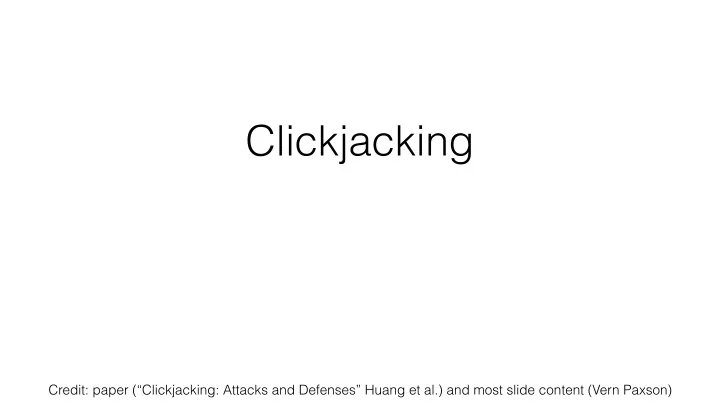

Clickjacking Credit: paper (“Clickjacking: Attacks and Defenses” Huang et al.) and most slide content (Vern Paxson)
Misleading users • Browser assumes that clicks and keystrokes = clear indication of what the user wants to do • Constitutes part of the user’s trusted path • Attacker can meddle with integrity of this relationship in all sorts of ways
Misleading users • Browser assumes that clicks and keystrokes = clear indication of what the user wants to do • Constitutes part of the user’s trusted path • Attacker can meddle with integrity of this relationship in all sorts of ways • Recall the power of Javascript Alter page contents (dynamically) • Track events (mouse clicks, motion, keystrokes) • • Read/set cookies • Issue web requests, read replies
Using JS to Steal Facebook Likes Claim your free iPad! Bait and switch User tries to claim their free iPad, but you want them to click your Like button (Many of these attacks are similar to TOCTTOU vulnerabilities)
Using JS to Steal Facebook Likes Claim your free iPad! User intent Bait and switch User tries to claim their free iPad, but you want them to click your Like button (Many of these attacks are similar to TOCTTOU vulnerabilities)
Using JS to Steal Facebook Likes Claim your free iPad! Actual outcome User intent Bait and switch User tries to claim their free iPad, but you want them to click your Like button (Many of these attacks are similar to TOCTTOU vulnerabilities)
Clickjacking When one principal tricks the user into interacting with UI elements of another principal An attack application (script) compromises the context integrity of another application’s User Interface when the user acts on the UI
Clickjacking When one principal tricks the user into interacting with UI elements of another principal An attack application (script) compromises the context integrity of another application’s User Interface when the user acts on the UI 1. Visual context : what a user should see right before the sensitive action. Ensuring this = the sensitive Context UI element and the cursor are both visible Integrity 2. Temporal context : the timing of a user action. Ensuring this = the user action at a particular time is what the user intended
Compromising visual integrity of the target • Hide the target element • CSS lets you set the opacity of an element to zero (clear)
Compromising visual integrity of the target • Hide the target element • Partially overlay the target • CSS lets you set the opacity of • Or crop the parts you don’t want to show an element to zero (clear) To: Bad guy Pay From: Victim Amount: $1000
Compromising visual integrity of the target • Hide the target element • Partially overlay the target • CSS lets you set the opacity of • Or crop the parts you don’t want to show an element to zero (clear) To: Bad guy To: Charity Pay From: Victim From: Nice person Amount: $1000 Amount: $10
Compromising visual integrity of the pointer Claim your free iPad! Actual cursor • Manipulating cursor feedback
Compromising visual integrity of the pointer Claim your free iPad! Displayed cursor Actual cursor • Manipulating cursor feedback
Compromising visual integrity of the pointer Claim your free iPad! Displayed cursor Actual cursor • Manipulating cursor feedback
Clickjacking to access a user’s webcam
Some clickjacking defenses • Require confirmation for actions • Annoys users • Frame-busting : Website ensures that its “vulnerable” pages can’t be included as a frame inside another browser frame • So user can’t be looking at it with something invisible overlaid on top… • …nor have the site invisible above something else
The attacker implements this by placing Twitter’s page in a “Frame” inside their own page, otherwise they wouldn’t overlap
Some clickjacking defenses • Require confirmation for actions • Annoys users • Frame-busting : Website ensures that its “vulnerable” pages can’t be included as a frame inside another browser frame • So user can’t be looking at it with something invisible overlaid on top… • …nor have the site invisible above something else • Conceptually implemented with Javascript like if(top.location != self.location) top.location = self.location; (actually, it’s quite tricky to get this right) • Current research considers more general approaches
InContext Defense (recent research) • A set of techniques to ensure context integrity for user actions • Servers opt-in • Let the websites indicate their sensitive UIs • Let browsers enforce context integrity when users act on the sensitive UIs
Ensuring visual integrity of pointer • Remove cursor customization • Attack success: 43% -> 16%
Ensuring visual integrity of pointer • Lightbox effect around target on pointer entry • Attack success (freezing + lightbox): 2%
Enforcing temporal integrity • UI delay: after visual changes on target or pointer, invalidate clicks for a few milliseconds • Pointer re-entry: after visual changes on target, invalidate clicks until pointer re-enters target
Other forms of UI sneakiness • Along with stealing events, attackers can use the power of Javascript customization and dynamic changes to mess with the user’s mind • For example, the user may not be paying attention, so you can swap tabs on them • Or they may find themselves “eclipsed”
Browser in browser
Recommend
More recommend